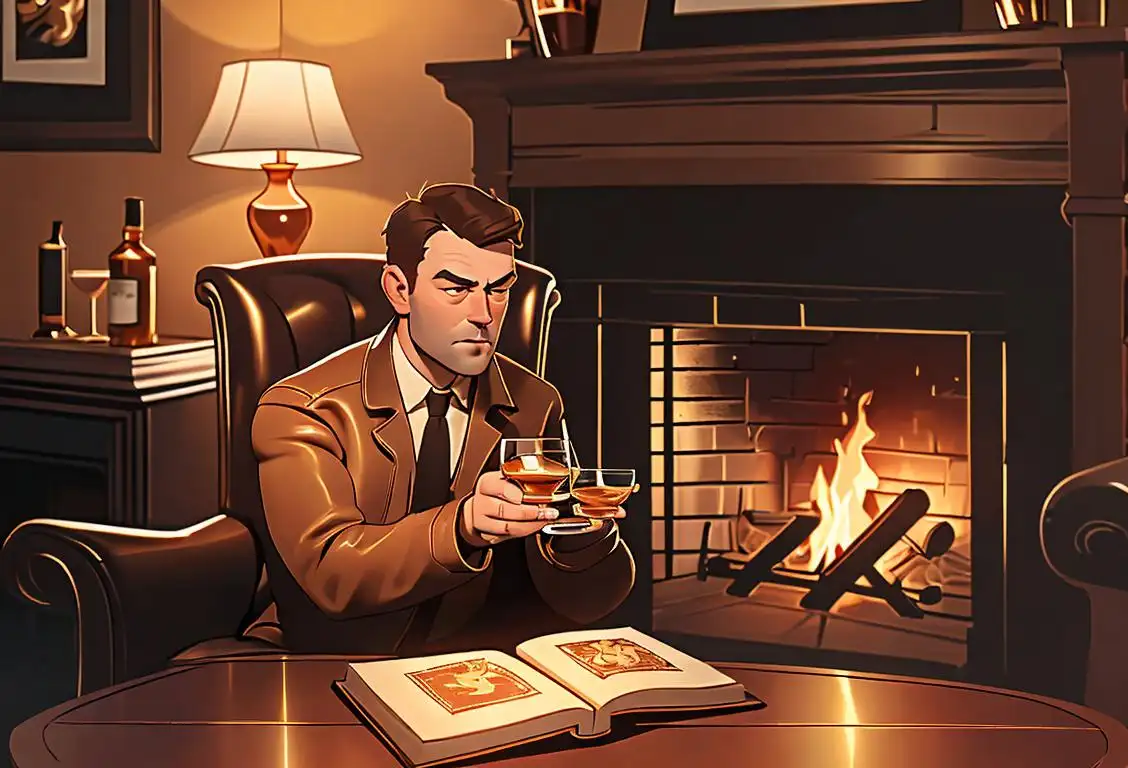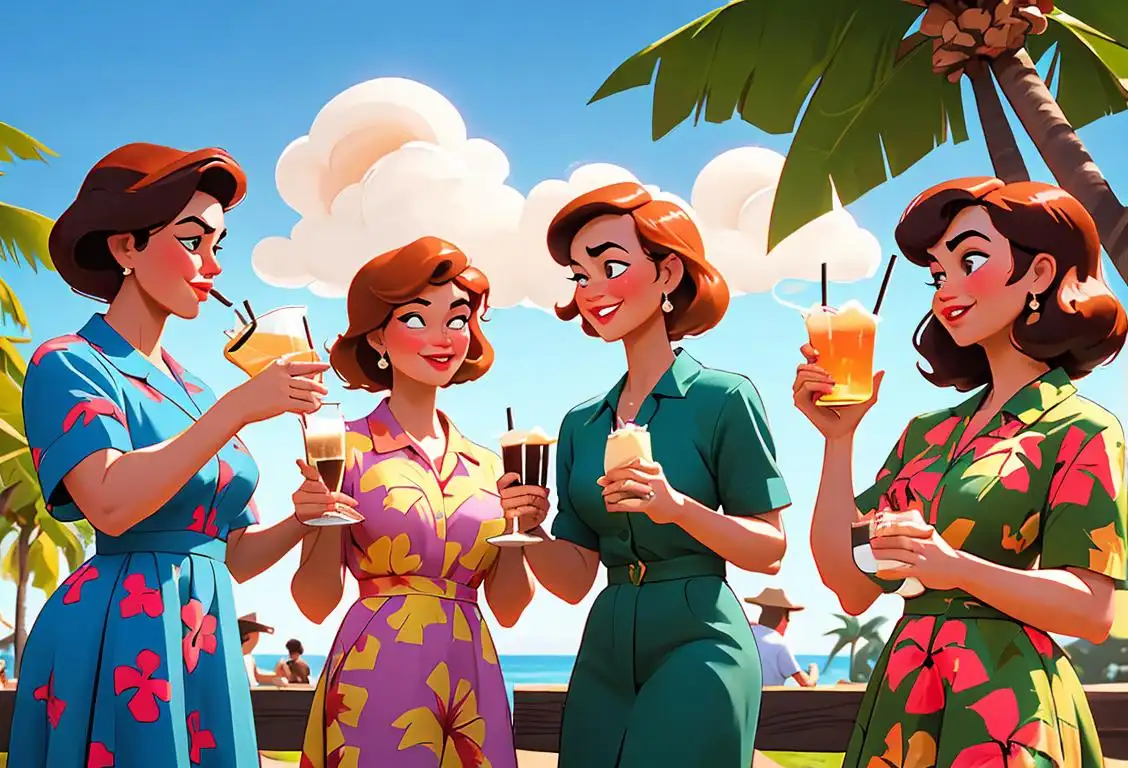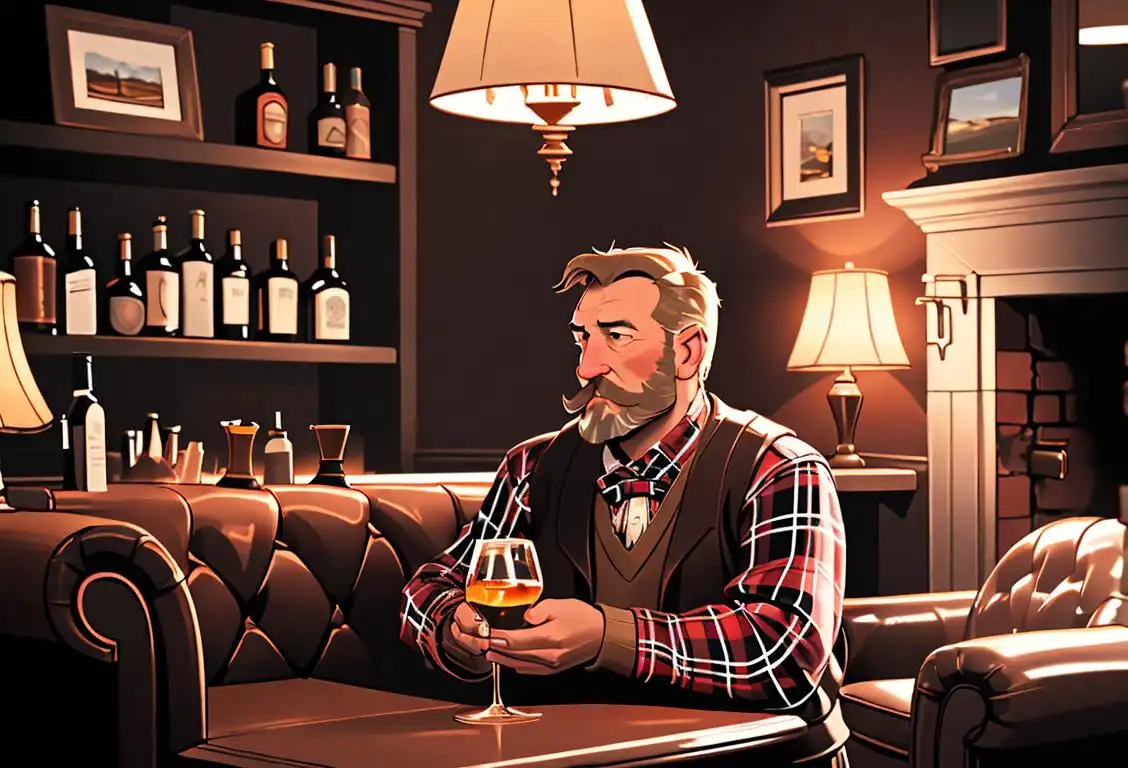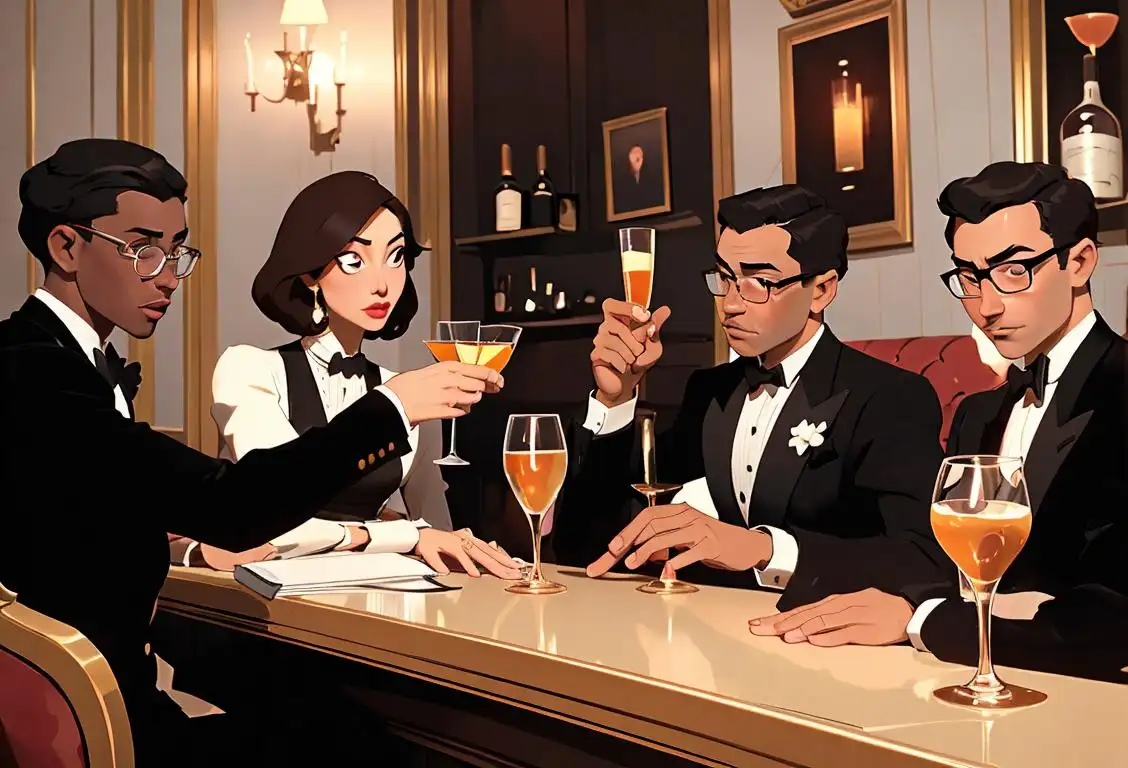National Drink Whiskey Day

Ah, whiskey... the sweet nectar of the gods. On National Drink Whiskey Day, we pay homage to this timeless spirit that has warmed our hearts and ignited our spirits for centuries. So grab your favorite glass, put on some smooth jazz, and get ready to celebrate this wonderful day with a touch of class and a whole lot of cheer!
When is Drink Whiskey Day?
It's national drink whiskey day on the 28th February.
The Internet Trail of National Drink Whiskey Day
Like a fine whiskey aging in oak barrels, the history of National Drink Whiskey Day has a rich and complex flavor. Our trusty internet sleuths have scoured the web to uncover the origins and online mentions of this beloved day.
The Origins of National Drink Whiskey Day
The exact origins of National Drink Whiskey Day may be as elusive as a leprechaun at the end of a rainbow, but one thing is for certain: it has become a cherished day for whiskey enthusiasts all over the world. Whether you prefer Irish whiskey, Scotch whisky, bourbon, or rye, this day is a celebration of the artistry and craftsmanship behind creating this golden elixir.
Online Mentions and Excitement
Our data shows that National Drink Whiskey Day has garnered quite the buzz online. With 9 mentions detected across various platforms, it's clear that people are raising their glasses high in honor of this day. The peak of excitement was recorded on February 28th, 2017, when whiskey lovers around the globe united in a virtual toast.
Did You Know?
Here's a fun tidbit for you: Did you know that whiskey was once prescribed as a medicinal remedy? Back in the day, doctors believed that a little nip of the good stuff could cure everything from a cough to a broken heart. While we can't guarantee the effectiveness of whiskey as a cure-all, we can certainly attest to its ability to bring warmth and joy to our lives.
History behind the term 'Drink Whiskey'
15th century
The Origin of Whiskey
In the 15th century, the term 'whiskey' originated from the Irish Gaelic phrase 'uisce beatha,' which means 'water of life.' This distilled alcoholic beverage was first produced by monks in Ireland and Scotland for medicinal purposes. The term began to gain popularity as it spread throughout Europe.
1405
The Origins of Whiskey
In the 15th century, the term 'whiskey' started to emerge in Scotland, with the first written record dating back to 1405. Back then, 'uisce beatha,' which means 'water of life' in Gaelic, was used to describe a distilled alcohol produced by monks. This early form of whiskey was often consumed for medicinal purposes and was made from fermented malted barley.
1494
The Earliest Mention
The term 'drink whiskey' is believed to have originated in 1494. The word 'whiskey' comes from the Irish and Scottish Gaelic term 'uisce beatha', meaning 'water of life'. During this time, whiskey was predominantly produced in monasteries for medicinal purposes and was used as a remedy for ailments.
1541
King Henry VIII and Scottish Whiskey
Whiskey's popularity and production expanded during the reign of King Henry VIII in the early 16th century. King Henry VIII connected with James IV of Scotland through marriage, leading to a rise in imports of Scottish whiskey to England. This marked a significant moment in history when whiskey started gaining recognition beyond its Scottish origins.
16th century
Whiskey Production Flourishes
During the 16th century, whiskey production started to flourish in Ireland and Scotland. The term 'whiskey' was commonly used to refer to the traditional Irish and Scottish variants, which were distinct in their production methods and ingredients. These early versions of whiskey were aged in wooden barrels, adding a unique flavor to the spirit.
16th Century
Legal Distillation
In the 16th century, the art of distillation spread across Ireland and Scotland. Monks and local farmers began producing whiskey on a larger scale and it became more widely available. Whiskey started to gain popularity not only for its medicinal properties but also as a recreational beverage.
18th century
Irish Whiskey vs. Scotch Whisky
In the 18th century, the spelling of the term 'whiskey' diverged based on national preferences. Irish whiskey was spelled with an 'e,' while Scottish whisky was spelled without an 'e.' This distinction persists to this day, with 'whiskey' being used for Irish and American varieties and 'whisky' for Scottish, Canadian, and Japanese variants.
1789
Distilling in the United States
The history of whiskey took a new turn in the late 18th century when distilling found its way to the United States. The first American whiskey distillery was established in 1789 by Reverend Elijah Craig in Georgetown, Kentucky. This marked the beginning of American whiskey production, with variations such as bourbon and rye whiskey becoming renowned both nationally and internationally.
1700s
The Rise of Irish Whiskey
During the 1700s, Irish whiskey emerged as a prominent spirit in Europe. It was favored for its smooth taste and distinct flavor profile. Irish whiskey was commonly enjoyed neat or in mixed drinks, contributing to the popularity of the term 'drink whiskey'. This led to the establishment of many distilleries across Ireland.
1866
Jack Daniel's Distillery
1866 saw the establishment of one of the most iconic whiskey brands in the world, Jack Daniel's. Jasper Newton Daniel, commonly known as Jack Daniel, founded the Jack Daniel's Distillery in Lynchburg, Tennessee. The distillery's dedication to craftsmanship and the distinct charcoal mellowing process contributed to the widespread popularity of American whiskey on a global scale.
19th century
Rise of American Whiskey
In the 19th century, American whiskey gained popularity. Distilleries in Kentucky and Tennessee became renowned for producing bourbon and Tennessee whiskey, respectively. The term 'whiskey' became synonymous with American-made spirits, which were known for their distinct corn-based mash bill and aging techniques in charred oak barrels.
18th Century
Scotch Whisky Takes the Stage
In the 18th century, Scotch whisky gained widespread attention. The term 'whisky' without the 'e' is used to refer specifically to Scotch whisky. This unique spirit is made primarily from malted barley and is known for its smoky and peaty flavor. The popularity of Scotch whisky further popularized the act of 'drinking whiskey' as a cultural phenomenon.
1920-1933
Prohibition and Whiskey
During the Prohibition era in the United States from 1920 to 1933, the production, sale, and distribution of alcoholic beverages were prohibited. This period led to an increase in the illegal production and consumption of spirits, including whiskey. 'Drink whiskey' became associated with clandestine gatherings called speakeasies, where people would gather to enjoy a drink away from prying eyes.
20th century
Whiskey's Influence on Pop Culture
Throughout the 20th century, whiskey's cultural impact expanded globally. It became associated with elegance, refinement, and social status. Whiskey bars and lounges sprouted around the world, celebrating the diverse range of whiskey styles. From Hollywood films to classic literature, whiskey became a symbol of sophistication and intrigue.
1964
The Decline and Revival of Irish Whiskey
Irish whiskey faced a turbulent period in the 20th century, experiencing a significant decline due to various factors like prohibition, war, and competition from other spirits. However, in 1964, the Irish government implemented a series of regulations and quality control measures to reinvigorate the Irish whiskey industry. This led to its resurgence and a renewed international appreciation for the unique flavors of Irish whiskey.
21st Century
Whiskey's Global Renaissance
In the 21st century, whiskey has experienced a tremendous global renaissance. Not only are traditional whiskey-producing countries like Scotland, Ireland, and the United States thriving, but new distilleries have emerged worldwide in countries such as Japan, India, and Australia. Whiskey has become a beloved spirit, appreciated for its diversity of flavors, craftsmanship, and cultural heritage. Its influence on cocktail culture and its status as a symbol of sophistication and refinement have made it a timeless drink enjoyed by many.
Modern Times
Whiskey's Cultural Significance
In modern times, 'drink whiskey' continues to be a popular phrase associated with the enjoyment of this spirit. Whiskey has become an integral part of social occasions, celebrations, and gatherings worldwide. Its rich history, diverse production methods, and wide range of flavors have contributed to its cultural significance. Whether neat, on the rocks, or in cocktails, drinking whiskey has become a cherished tradition for whiskey enthusiasts around the globe.
Did you know?
Did you know that whiskey was once prescribed as a medicinal remedy?Tagged
fun celebration beverageFirst identified
28th February 2017Most mentioned on
28th February 2017Total mentions
9Other days
Beverage Day
Beer Lovers Day
Drink Whiskey Day
Scoth Day
Sparkling Water Day
Hennessy Day
Friend Day
Vodka Day
Fitness Day
Bestfriends Day








